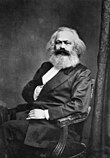
Back Produktivkraft German Fuerzas productivas Spanish Ekoizpen-indar Basque Forces productives French Forzas produtivas Galician Kekuatan produktif ID Өндіргіш күштер Kazakh 생산력 Korean Facultates productionis Latin Produktivkrefter NB
| Part of a series on the |
| Marxian critique of political economy |
|---|
 |
This article has multiple issues. Please help improve it or discuss these issues on the talk page. (Learn how and when to remove these template messages)
|
Productive forces, productive powers, or forces of production (German: Produktivkräfte) is a central idea in Marxism and historical materialism.
In Karl Marx and Friedrich Engels' own critique of political economy, it refers to the combination of the means of labor (tools, machinery, land, infrastructure, and so on) with human labour power. Marx and Engels probably derived the concept from Adam Smith's reference to the "productive powers of labour" (see e.g. chapter 8 of The Wealth of Nations (1776)), although the German political economist Friedrich List also mentions the concept of "productive powers" in The National System of Political Economy (1841).
All those forces which are applied by people in the production process (body and brain, tools and techniques, materials, resources, quality of workers' cooperation, and equipment) are encompassed by this concept, including those management and engineering functions technically indispensable for production (as contrasted with social control functions). Human knowledge can also be a productive force.
Together with the social and technical relations of production, the productive forces constitute a historically specific mode of production.
© MMXXIII Rich X Search. We shall prevail. All rights reserved. Rich X Search